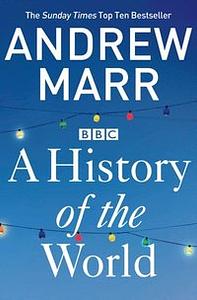Take a photo of a barcode or cover
informative
medium-paced
A lot of good material presented in an entertaining way. Too much of a narrative of inevitable finger of fate. Smoothly and clearly written.
3.5 stars.
Probably would’ve been four if there weren’t aggravating typos in the kindle edition.
I have some beef with the structure of the book. As great as a chronological approach is, it means that we find ourselves jumping around (some parts of) the globe an awful lot. Not particularly useful when something from 300 pages earlier is referred to that you can just about remember reading. A better layout perhaps would’ve been by theme - religion, war, science, economics? Or by geographical location - though some chapters would be shockingly short or simply wouldn’t exist.
I found the focus on the northern hemisphere quite annoying also. It cannot be a history of the world if South America is ignored, we only encounter Africa in the ancient eras, the slave trade and the scramble for Africa, and the Middle East is only really touched upon in the renaissance and then for Britain and America’s meddling and bombing. In Asia, only India, China and Japan are focused on, usually as a supporting actor to the dramatic sequences played out again by Britain and America. Australia again, touched upon as a colony and not for its rich aboriginal heritage. And to completely brush over exploration and the race to the poles, alongside geopolitical claims of the Arctic is peculiar considering the obsession with Elizabethan explorers of the new world. Of course you cannot ignore world superpowers and the role they have played in history, but from the early chapters I expected to find so much more about everywhere else as their ancient histories were so detailed. To also almost suggest that ancient Egypt left virtually no mark on the world other than one of the most mysterious cultures that fascinates people the world over? I can’t forgive.
The last chapter also feels rushed to me and like it should’ve been in two parts. To cram two world wars, various acts of independence, communist revolutions, the atomic bomb, the dawn of AI, a brief brushing on contraception and the sexual revolution, the threat of terrorism and global warming into a chapter of the same length of those with lost histories seems absurd. Again, this is a chapter that would’ve benefited from a different layout to the whole book, ending each themed chapter with where we find ourselves today, instead of the whole book ending on how we would all die if everyone consumed in the way that North Americans do (which isn’t wrong, but this is the development we end on? Out of all the incredible advances mankind has made?)
Not a bad book, it just could’ve been so much more.
Probably would’ve been four if there weren’t aggravating typos in the kindle edition.
I have some beef with the structure of the book. As great as a chronological approach is, it means that we find ourselves jumping around (some parts of) the globe an awful lot. Not particularly useful when something from 300 pages earlier is referred to that you can just about remember reading. A better layout perhaps would’ve been by theme - religion, war, science, economics? Or by geographical location - though some chapters would be shockingly short or simply wouldn’t exist.
I found the focus on the northern hemisphere quite annoying also. It cannot be a history of the world if South America is ignored, we only encounter Africa in the ancient eras, the slave trade and the scramble for Africa, and the Middle East is only really touched upon in the renaissance and then for Britain and America’s meddling and bombing. In Asia, only India, China and Japan are focused on, usually as a supporting actor to the dramatic sequences played out again by Britain and America. Australia again, touched upon as a colony and not for its rich aboriginal heritage. And to completely brush over exploration and the race to the poles, alongside geopolitical claims of the Arctic is peculiar considering the obsession with Elizabethan explorers of the new world. Of course you cannot ignore world superpowers and the role they have played in history, but from the early chapters I expected to find so much more about everywhere else as their ancient histories were so detailed. To also almost suggest that ancient Egypt left virtually no mark on the world other than one of the most mysterious cultures that fascinates people the world over? I can’t forgive.
The last chapter also feels rushed to me and like it should’ve been in two parts. To cram two world wars, various acts of independence, communist revolutions, the atomic bomb, the dawn of AI, a brief brushing on contraception and the sexual revolution, the threat of terrorism and global warming into a chapter of the same length of those with lost histories seems absurd. Again, this is a chapter that would’ve benefited from a different layout to the whole book, ending each themed chapter with where we find ourselves today, instead of the whole book ending on how we would all die if everyone consumed in the way that North Americans do (which isn’t wrong, but this is the development we end on? Out of all the incredible advances mankind has made?)
Not a bad book, it just could’ve been so much more.
challenging
informative
medium-paced
Last year I decided to take the Texas certification test for history grades 8-12. It covers historical topics from world history, US history, government, world geography, and economics from pre-civilization to the present. I thought to myself, "wow, that's a lot to know." I have my English certification, so I've taken one of these tests before. I've also taken the GRE, but the vast scope of the material of this test made me nervous. I decided that I needed to brush up on my world history as part of my preparation.
I bought this book on my Kindle and started reading a little bit every night and more on weekends. I immediately liked it. The tone is not dry, as many history books can be. The transitions from topic to topic were logical and meaningful. I was refreshed on some points that I knew already, and I learned quite a few things about others.
I wouldn't recommend it as comprehensive for anyone who didn't already have a basic foundation in history. There are spots where the author more or less assumes that the reader knows what will happen next. And toward the 19th and 20th centuries it felt rushed, like Marr was just trying to wrap up the whole thing.
But really, it was a well rewarding read. I think it helped me on the test, which was what I needed it to do.
I bought this book on my Kindle and started reading a little bit every night and more on weekends. I immediately liked it. The tone is not dry, as many history books can be. The transitions from topic to topic were logical and meaningful. I was refreshed on some points that I knew already, and I learned quite a few things about others.
I wouldn't recommend it as comprehensive for anyone who didn't already have a basic foundation in history. There are spots where the author more or less assumes that the reader knows what will happen next. And toward the 19th and 20th centuries it felt rushed, like Marr was just trying to wrap up the whole thing.
But really, it was a well rewarding read. I think it helped me on the test, which was what I needed it to do.
This would be a good book for someone who knows practically nothing about history. It is a collection of the most popular stories about people who are traditionally the most infamous.
informative
lighthearted
reflective
relaxing
medium-paced
Simply phenomenal, a must read for anyone with an interest in History.
Interesting and ambitious but by no means flawless. White, male, western-centric; there is greater focus on the humanity of (and appeals for empathy for) the Confederate soldiers in the US Civil War than the African American slaves whom they fought to maintain in slavery. Tends to present issues as mutually exclusive categories. Women, native peoples, non-whites and the poor are each treated as separate and subsidiary entities, sidelined from the dominant whose experiences are presented as the national standard. There is rare acknowledgement of those whose identities intersect across the binary groupings - for example, the dates of female enfranchisement make no mention of limitations on racial voting limitations, thereby considering ‘women’ as represented solely by white, often wealthy, women.



